Hyundai i10 vs Toyota Yaris - Differences and prices compared
Compare performance (90 HP vs 280 HP), boot space and price (14600 £ vs 21900 £ ) at a glance. Find out which car is the better choice for you – Hyundai i10 or Toyota Yaris?
Costs and Efficiency:
Price and efficiency are often the first things buyers look at. Here it becomes clear which model has the long-term edge – whether at the pump, the plug, or in purchase price.
Hyundai i10 has a clearly advantage in terms of price – it starts at 14600 £ , while the Toyota Yaris costs 21900 £ . That’s a price difference of around 7295 £.
Fuel consumption also shows a difference: Toyota Yaris manages with 3.80 L and is therefore clearly perceptible more efficient than the Hyundai i10 with 4.90 L. The difference is about 1.10 L per 100 km.
Engine and Performance:
Under the bonnet, it becomes clear which model is tuned for sportiness and which one takes the lead when you hit the accelerator.
When it comes to engine power, the Toyota Yaris has a convincingly edge – offering 280 HP compared to 90 HP. That’s roughly 190 HP more horsepower.
In acceleration from 0 to 100 km/h, the Toyota Yaris is convincingly quicker – completing the sprint in 5.50 s, while the Hyundai i10 takes 11.40 s. That’s about 5.90 s faster.
In terms of top speed, the Toyota Yaris performs clearly perceptible better – reaching 230 km/h, while the Hyundai i10 tops out at 175 km/h. The difference is around 55 km/h.
There’s also a difference in torque: Toyota Yaris pulls significantly stronger with 390 Nm compared to 172 Nm. That’s about 218 Nm difference.
Space and Everyday Use:
Cabin size, boot volume and payload all play a role in everyday practicality. Here, comfort and flexibility make the difference.
Both vehicles offer seating for 5 people.
In curb weight, Hyundai i10 is slight lighter – 996 kg compared to 1090 kg. The difference is around 94 kg.
In terms of boot space, the Toyota Yaris offers to a small extent more room – 286 L compared to 252 L. That’s a difference of about 34 L.
In maximum load capacity, the Hyundai i10 performs somewhat better – up to 1050 L, which is about 115 L more than the Toyota Yaris.
When it comes to payload, Toyota Yaris a bit takes the win – 525 kg compared to 423 kg. That’s a difference of about 102 kg.
Who comes out on top?
Overall, the Toyota Yaris shows itself to be leaves the rival little chance and secures the title of DriveDuel Champion.
It convinces with the more balanced overall package and proves to be the more versatile choice for everyday use.

Toyota Yaris
Costs and Consumption
View detailed analysis
Engine and Performance
View detailed analysis
Dimensions and Body
View detailed analysis
Hyundai i10
The Hyundai i10 is a cheeky city car that squeezes big-car confidence into a pocket-friendly package, carving through tight streets with surprising composure and sensible practicality. For buyers after low fuss, sensible equipment and wallet-friendly running costs, it's a smart, no-nonsense pick that makes sense whether you're a first-time driver or need a reliable second car.
details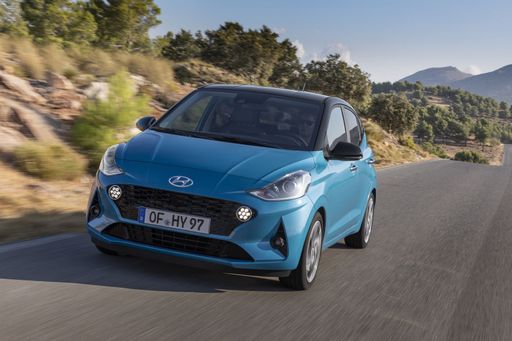
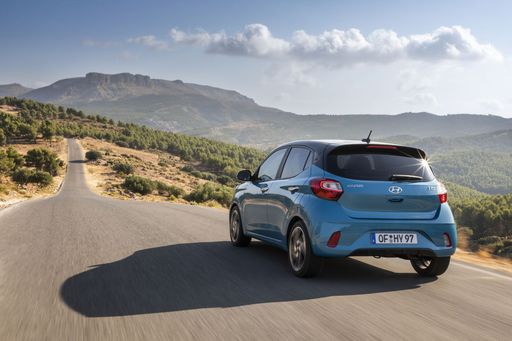
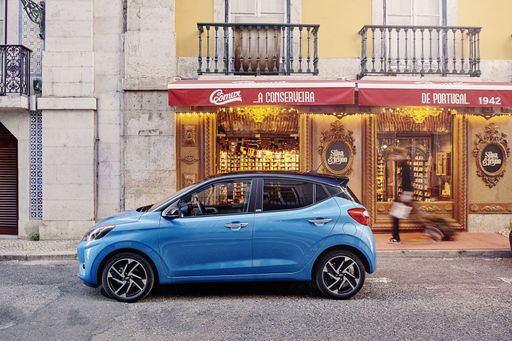
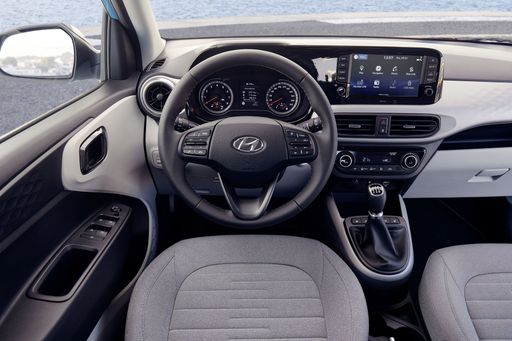
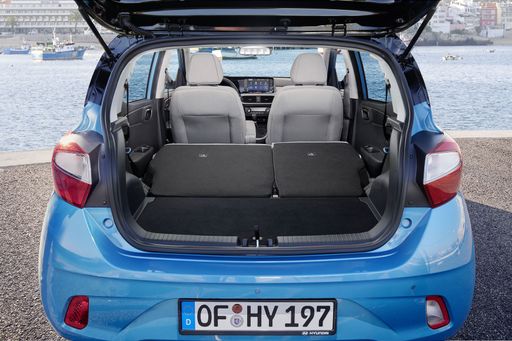
Toyota Yaris
The Toyota Yaris is a sprightly city hatch that packs clever packaging, surprising comfort and fuel-sipping manners into a neat, easy-to-park package. It rewards sensible buyers with low running costs, friendly ergonomics and a forgiving drive, delivered with Japanese reliability and just enough personality to make errands feel a little less ordinary.
details

Costs and Consumption |
|
|---|---|
|
Price
14600 - 19000 £
|
Price
21900 - 46700 £
|
|
Consumption L/100km
4.9 - 5.5 L
|
Consumption L/100km
3.8 - 9.5 L
|
|
Consumption kWh/100km
-
|
Consumption kWh/100km
-
|
|
Electric Range
-
|
Electric Range
-
|
|
Battery Capacity
-
|
Battery Capacity
-
|
|
co2
110 - 124 g/km
|
co2
87 - 215 g/km
|
|
Fuel tank capacity
36 L
|
Fuel tank capacity
36 - 50 L
|
Dimensions and Body |
|
|---|---|
|
Body Type
Hatchback
|
Body Type
Hatchback
|
|
Seats
4 - 5
|
Seats
4 - 5
|
|
Doors
5
|
Doors
3 - 5
|
|
Curb weight
996 - 1099 kg
|
Curb weight
1090 - 1356 kg
|
|
Trunk capacity
252 L
|
Trunk capacity
141 - 286 L
|
|
Length
3670 - 3675 mm
|
Length
3940 - 3995 mm
|
|
Width
1680 mm
|
Width
1745 - 1805 mm
|
|
Height
1480 - 1483 mm
|
Height
1455 - 1500 mm
|
|
Max trunk capacity
1050 L
|
Max trunk capacity
935 L
|
|
Payload
344 - 423 kg
|
Payload
289 - 525 kg
|
Engine and Performance |
|
|---|---|
|
Engine Type
Petrol
|
Engine Type
Full Hybrid, Petrol
|
|
Transmission
Manuel, Automatic
|
Transmission
Automatic, Manuel
|
|
Transmission Detail
Manual Gearbox, Automated Manual
|
Transmission Detail
CVT, Manual Gearbox, Automatic Gearbox
|
|
Drive Type
Front-Wheel Drive
|
Drive Type
Front-Wheel Drive, All-Wheel Drive
|
|
Power HP
63 - 90 HP
|
Power HP
116 - 280 HP
|
|
Acceleration 0-100km/h
11.4 - 18.4 s
|
Acceleration 0-100km/h
5.5 - 9.7 s
|
|
Max Speed
143 - 175 km/h
|
Max Speed
175 - 230 km/h
|
|
Torque
93 - 172 Nm
|
Torque
390 Nm
|
|
Number of Cylinders
3 - 4
|
Number of Cylinders
3
|
|
Power kW
46 - 66 kW
|
Power kW
85 - 206 kW
|
|
Engine capacity
998 - 1197 cm3
|
Engine capacity
1490 - 1618 cm3
|
General |
|
|---|---|
|
Model Year
2024
|
Model Year
2024 - 2025
|
|
CO2 Efficiency Class
C, D
|
CO2 Efficiency Class
B, G
|
|
Brand
Hyundai
|
Brand
Toyota
|
Is the Hyundai i10 offered with different drivetrains?
The Hyundai i10 is offered with Front-Wheel Drive.




